For my investigation into the Linn letters I used a set of word I initially hypothesized to have some relation to the internal changes within Linn himself. The Jakacki hypothesis states, that a profound shift can be found half-way through the text that reveals a deep change and loss of innocence for Linn. Using the words received, brother and mother I was able to gain some insight into Linn’s relationship to his own family and Linn’s level of acknowledgment and mutual interest among those closest to him. The visualization revealed little other than that mention of family increases near the beginning and end of the letters. I find little evidence to either verify or refute the original hypothesis, even carefully chosen words reveal few patterns as do carefully selected sets of words. I believe that Linn’s writing style makes it exceptionally difficult to derive deeper trends within his texts. My own investigation didi reveal that he rarely mentions any family member other than immediately after he left and before he came back, hardly evidence for the hypothesis.
The technique of using transcribed text and visual analysis tools might be helpful in some situations. Unfortunately, I have found little evidence that those methods reveal any more information in this particular case. This does not mean that distant reading methods are entirely ineffective, as the cirrus cloud did illustrate the relationships between words and their frequency. Small trends like the appearance of the word “boat” and “wounded” did match up with the general shape of Linn’s experiences. Overall however, this particular exercise revealed little evidence to support the hypothesis. 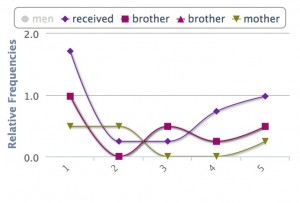
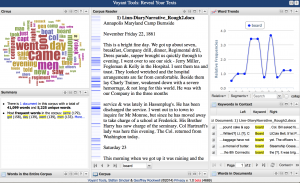
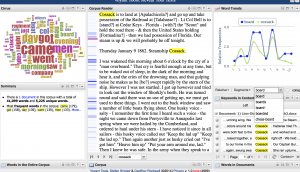
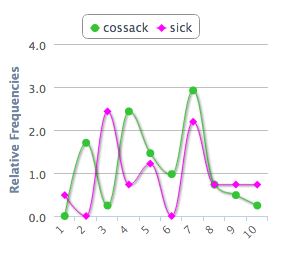 e another. The first thing I noticed was how extreme the frequencies were, they never really remained flat for a long period of time. The result of comparing them was also not what I expected. In segments 1, 2, 3, and 4 the two words did not have even slightly similar word trends, they were complete opposites. However, in segments 5, 7, 8 and 9 they had either identical word trends or very similar ones, as shown below. And although this somewhat supports my hypothesis, it does not completely.
e another. The first thing I noticed was how extreme the frequencies were, they never really remained flat for a long period of time. The result of comparing them was also not what I expected. In segments 1, 2, 3, and 4 the two words did not have even slightly similar word trends, they were complete opposites. However, in segments 5, 7, 8 and 9 they had either identical word trends or very similar ones, as shown below. And although this somewhat supports my hypothesis, it does not completely.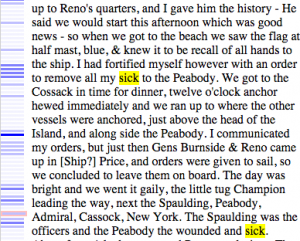 diary entry, “sick” was used 4 times, and in the one right after it was used 5 times. “Cossack” is used, as I expected, most often when they are aboard the ship, but also when they are about to go on it or right after they got off the boat. The word frequencies overlap especially in segments 5 and 8 because that is when the men in the army and their prisoners were getting very sick aboard the ship.
diary entry, “sick” was used 4 times, and in the one right after it was used 5 times. “Cossack” is used, as I expected, most often when they are aboard the ship, but also when they are about to go on it or right after they got off the boat. The word frequencies overlap especially in segments 5 and 8 because that is when the men in the army and their prisoners were getting very sick aboard the ship.